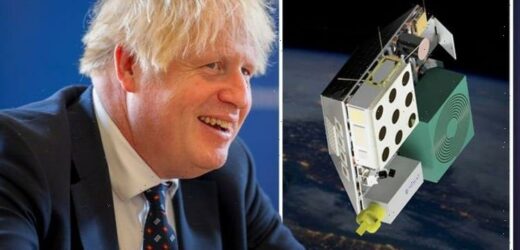Dr. David Whitehouse hails UK as 'major player' in space industries
We use your sign-up to provide content in ways you’ve consented to and to improve our understanding of you. This may include adverts from us and 3rd parties based on our understanding. You can unsubscribe at any time. More info
The washing machine-sized satellite will be built here in the UK by Hampshire-based firm In-Space Missions. The well-paying contract will support at least 20 jobs at the company while bolstering the MoD’s efforts to protect the UK from space. As the battlefield of the future moves into low-Earth orbit (LEO), the Armed Forces are increasingly reliant on high-bandwidth free-space optical communications or FSOC.
According to Air Vice Marshal Paul Godfrey, strengthening Britain’s position in space is essential to maintaining our way of life.
Titania is pencilled in to launch in 2023 in support of the Titania Operational Concept Demonstrator.
The mission will test the military applications of FSOC technology in Earth orbit.
The satellite will transmit data from the ground to space using narrow beams of lasers.


Titania will communicate directly with “Puck”, a new Optical Ground Station built by the Government’s Defence Science and Technology Laboratory (Dstl).
Dr Mike O’Callaghan, Dstl’s programme manager, said: “The Titania space mission will accelerate the development and adoption of space-based optical communications, allowing our Armed Forces the ability to operate in an increasingly contested environment.
“The Titania satellite will support the UK space sector and provide a solid foundation on which to conduct experimentation into FSOC and allow the science to be developed.
“We are delighted to be working with In-Space Missions on this highly innovative project.”
Ministry of Defence announce new frigate ships at cost of £3.7bn
The use of FSOC tech in space will facilitate breakneck transfer speeds of multi-Gigabytes per second.
This will allow the Armed Forces to make faster and better-informed decisions.
Titania, in particular, will focus on the speedy transfer of Intelligence, Surveillance and Reconnaissance data
Air Vice-Marshal Godfrey said: “Following our stand-up as a Joint Command, the Titania satellite contract is the next exciting step for the UK in space.


“It’s a brilliant example of the partnerships being developed and enhanced across the UK space enterprise, developing capabilities that not only enable military operations, but underpin countless activities essential to our way of life and the safety of our nation.”
Today’s announcement follows the recent launch of UK Space Command at RAF High Wycombe, which Air Vice-Marshal Godfrey said would counter “deeply concerning and potentially catastrophic” threats from the likes of China and Russia.
Titania’s contract was awarded to In-Space Missions as part of a £24billion investment announced by Prime Minister Boris Johnson last year.
More specifically, the MoD was handed more than £1.4billion to bolster the nation’s Defence Space Portfolio over the next 10 years.
Outlined in the Defence Command Paper, the Government has revealed its vision for the future of the UK’s Armed Forces.
Ben Wallace, Secretary of State for Defence, said in the paper’s foreword: “The Prime Minister’s vision for the UK in 2030 sees a stronger, more secure, prosperous and resilient Union, better equipped for a more competitive age, as a problem-solving and burden-sharing nation with a global perspective.
“To become so requires Britain’s soft and hard power to be better integrated.
“In this Defence in a more competitive age, a ‘Global Britain’ has no choice but to step up, ready to take on the challenges and shape the opportunities of the years ahead, alongside our allies and friends.”
Source: Read Full Article


